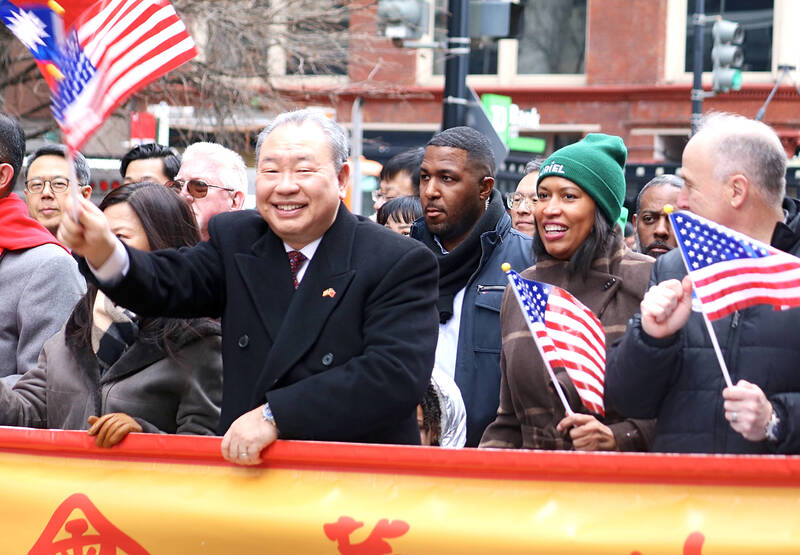Talks are in progress with the US over a freeze on foreign aid programs — including military assistance to Taiwan — and proposed sweeping tariffs on Taiwanese semiconductors, Representative to the US Alexander Yui (俞大?) said on Sunday.
On Jan. 24, the US Department of State temporarily halted almost all foreign assistance and paused new programs for 90 days to review whether they align with the policies of US President Donald Trump’s administration.
Washington told the Taipei Economic and Cultural Representative Office that the measures were temporary and do not indicate that all funding would be cut, Yui told reporters in Washington’s Chinatown following a Lunar New Year parade.

Photo: CNA
The White House told the office it is not a targeted measure against any particular country, but is intended to gain a comprehensive understanding of whether programs initiated under the administration of former US president Joe Biden align with Trump’s policies, he said.
Asked how long the aid suspension could last, Yui said that “we have a mutual understanding,” but declined to discuss details of the freeze regarding Taiwan’s military aid.
On Monday last week, Trump told Republican members of the US Congress about plans to impose a 100 percent tariff on chips exported to the US, with the US president again saying that 98 percent of the semiconductor industry has moved to Taiwan.
Communication is ongoing between Taiwan and the US, which have good relations in the chip industry, Yui said, adding that Taiwan is not a competitor to the US, but a reliable partner that can help “make America great again.”
Trump also proposed plans to impose sweeping tariffs on semiconductors, steel, aluminum, copper and pharmaceuticals at the House Republican Issues Conference in Miami, Florida.
Taiwan’s representative office told the US that Taiwan’s chip industry is just one part of the supply chain that uses US designs and precision instruments before being delivered to companies that commission Taiwan to manufacture the products, Yui said.
For every US$1 earned from semiconductor sales, US companies receive US$0.38, while Taiwanese companies earn US$0.11, he added.
A decade ago, 80 percent of Taiwan’s foreign investment went to China compared with 11 percent today, while 40 percent of current investments are going to the US, proving that Taiwan-US cooperation would continue to strengthen, he said.
Trump hopes to create more investments and job opportunities in the US during his second term, and the US-Taiwan Expedited Double-Tax Relief Act passed last month would increase Taiwanese investment in the US, he said.
Taiwan would continue to prove its usefulness in the artificial intelligence industry among other science and technology industries, he added.

The Taoyuan Flight Attendants’ Union yesterday vowed to protest at the EVA Air Marathon on Sunday next week should EVA Airway Corp’s management continue to ignore the union’s petition to change rules on employees’ leave of absence system, after a flight attendant reportedly died after working on a long-haul flight while ill. The case has generated public discussion over whether taking personal or sick leave should affect a worker’s performance review. Several union members yesterday protested at the Legislative Yuan, holding white flowers and placards, while shouting: “Life is priceless; requesting leave is not a crime.” “The union is scheduled to meet with

‘UNITED FRONT’ RHETORIC: China’s TAO also plans to hold weekly, instead of biweekly, news conferences because it wants to control the cross-strait discourse, an expert said China’s plan to expand its single-entry visa-on-arrival service to Taiwanese would be of limited interest to Taiwanese and is a feeble attempt by Chinese administrators to demonstrate that they are doing something, the Mainland Affairs Council said yesterday. China’s Taiwan Affairs Office (TAO) spokesman Chen Binhua (陳斌華) said the program aims to facilitate travel to China for Taiwanese compatriots, regardless of whether they are arriving via direct flights or are entering mainland China through Hong Kong, Macau or other countries, and they would be able to apply for a single-entry visa-on-arrival at all eligible entry points in China. The policy aims

Taipei, New Taipei City, Keelung and Taoyuan would issue a decision at 8pm on whether to cancel work and school tomorrow due to forecasted heavy rain, Keelung Mayor Hsieh Kuo-liang (謝國樑) said today. Hsieh told reporters that absent some pressing reason, the four northern cities would announce the decision jointly at 8pm. Keelung is expected to receive between 300mm and 490mm of rain in the period from 2pm today through 2pm tomorrow, Central Weather Administration data showed. Keelung City Government regulations stipulate that school and work can be canceled if rain totals in mountainous or low-elevation areas are forecast to exceed 350mm in

EVA Airways president Sun Chia-ming (孫嘉明) and other senior executives yesterday bowed in apology over the death of a flight attendant, saying the company has begun improving its health-reporting, review and work coordination mechanisms. “We promise to handle this matter with the utmost responsibility to ensure safer and healthier working conditions for all EVA Air employees,” Sun said. The flight attendant, a woman surnamed Sun (孫), died on Friday last week of undisclosed causes shortly after returning from a work assignment in Milan, Italy, the airline said. Chinese-language media reported that the woman fell ill working on a Taipei-to-Milan flight on Sept. 22